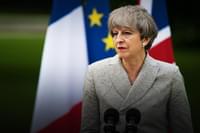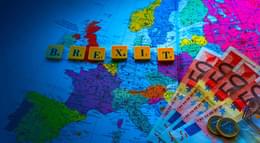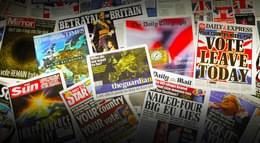
Chequers won support for the wrong reasons
The solution to the current Brexit impasse, says Bruce Newsome, is a new political administration led by Brexiteers, renouncing the May administration's negotiations to date.
Notice how the government's policy for Brexit is being spun, since it was agreed by the Cabinet at Chequers two months ago. Then it was sold as the best deal, now it is the imperfect step to something better.
Chequers is attracting supporters not because it is a good policy, but to shore up Theresa May, or the Conservative Party, or the EU's status quo, or out of distaste for the Conservatives who could take over from Theresa May. Chequers is supported for all the wrong reasons.
Where is the government's ambition? It's not promising the best deal for Britain, it's not sticking to its red lines, it's not even consistent. It's just aiming low and spinning high.
Consider how former Brexiteers in Cabinet are talking up Chequers. Michael Gove, the Environment Secretary, is pretending that the Chequers plan is the "right one for now" and could be altered in the future. This is reckless talk. He urges us to pay huge costs for a slight variant of current integration – on the pretence that it will be flexible in the future. Think about the circularities of this argument: he's suggesting that £40 billion and more than two years of banging our heads against the wall is worth an interim agreement, so that we can repeat the cycle. But wait, here's another circularity in his argument: the EU too could alter tomorrow whatever we agree today.
Liam Fox, the International Development Secretary, also implies that Chequers is just a stepping-stone to a better deal. He now praises the EU's "reassuring noises" and describes backing May as in the "national interest." How ironic is his claim, putting personal incumbency and the EU's incumbency before the national interest?
ConservativeHome's columnist on Brexit urges everybody to get behind Chequers, and blames opposition on the government's lacklustre marketing. "Although Chequers is far from perfect, it nonetheless offers a realistic plan for leaving the EU and a framework for a close partnership." No, it doesn't provide for leaving the EU, but yes, it does provide for a close partnership. We would be staying in the EU's common market and customs union, and thence the European Courts, except to withdraw the service sector. We're being offered a false choice between largely staying in or having no relationship at all.
The Daily Mail, within a week of losing one of the few Brexiteer editors in this country, now backs Chequers. To boot, it insults opponents as "traitors" and the "latest manifestation of the party's apparent death wish." It's offering a false choice between Chequers and treachery.
For her part, Theresa May expends most of her efforts not on the EU, but on attacking her domestic opponents and marketing herself. Last week, she and her supporters reacted with faux outrage at Boris Johnson's description of Chequers as a "suicide vest." Conservative headquarters is still planning to reprimand him for an earlier joke about burqas looking like letter boxes.
This week she gave a rare interview to urge the country to debate the country's future rather than her own – as if the country's future is not dependent on her premiership. She played on our sympathies by expressing how "irritated" she is. To appear relatable, she authorized a video of herself watching a television game show.
She repeated the promise that she would be a "bloody difficult woman" in the negotiations, but this is a misappropriation of Ken Clarke's complaint about her indecisiveness in 2016. Since spring 2017, she has been pretending that the phrase refers to herself as a hard negotiator with the EU (pause for ironic laughter). Why don't journalists hold her to account?
Theresa May's pretence at bloody difficult negotiating is actually to flip-flop and talk out of both sides of face. She now says that EU citizens won't get preferential immigration status, but she agreed back in December 2017 to align the rights of all EU residents within Britain with those without Britain. In between times, she's spun both sides. Why aren't journalists calling her to account?
Days later, she gave another interview speaking against a second referendum, so she can give a false choice between her way and the Remainers' way. "We gave people the opportunity to make a choice. They made that choice. If we as politicians want people to trust us, then we have to deliver for them on that." By her own standards, then, she's an untrustworthy hypocrite. She's giving us a false choice between faking Brexit and overturning the referendum.
At the EU summit in Salzburg this week, she gave EU leaders a false choice between Chequers and a hard Brexit. That's why the EU is now talking her up: she's the Remainer and fake Brexiteer they prefer over a real Brexiteer and bloody difficult negotiator. Yet at the same time, EU leaders repeated their demand for yet more concessions. The French President (Emmanuel Macron) voiced the general line that Britain cannot be in the single market for goods but not services. Keeping British services out is the only thing that really distinguishes Chequers from Remain. The EU's claim that the whole island of Ireland should remain in the EU rather than harden the British-Irish border was always a false choice that Theresa May should never have entertained.
Theresa May wants you to think that her plan for Brexit fulfils both the popular vote for separation and the elite's desire to remain in the single market and customs union. These two vectors are contradictory. The elite pretends that remaining is a constructive "soft Brexit," and that all other alternatives amount to a destructive "hard Brexit."
Yet what the elite calls "hard Brexit" would be the Brexit that was voted in 2016 – "leave the European Union." What they call "soft Brexit" is a fake Brexit – to "remain" in the EU to most practical purposes. Theresa May's scheduling of an end to membership in March 2019 is nominal, not practical.
May's soft Brexit would be the worst of both worlds: remaining subject to the EU to most practical purposes, without the influence that comes from being a full member.
Each of May's Brexit, the "Chequers plan," and "Soft Brexit" amounts to "Remain." I am tired of the government's spin otherwise, and of the news media's complicity.
The solution is, as I and others have been saying since December 2017, a new political administration led by Brexiteers, renunciation of the May administration's negotiations to date, and separation from the EU under WTO rules, until the EU offers us something better.









